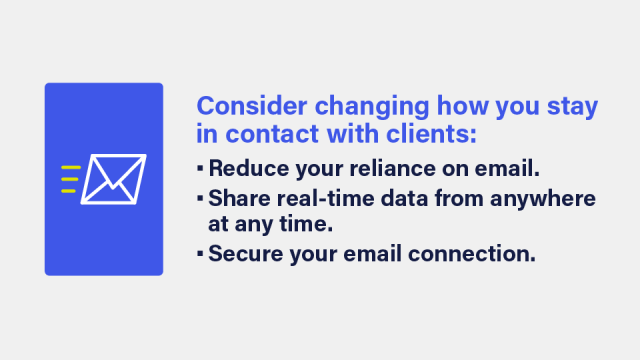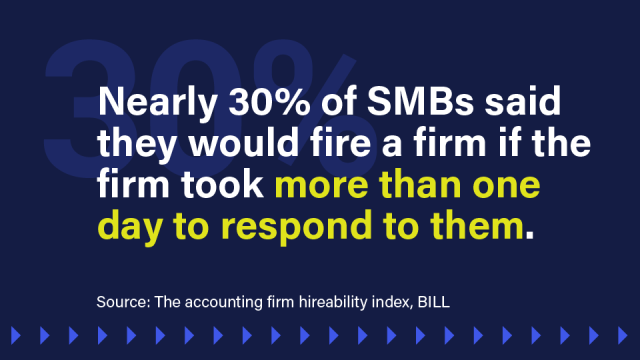Your clients want a closer relationship with you, and your firm can benefit from establishing itself as a trusted advisor. So, what’s holding you back from mastering client collaboration? It might be the methods you’re using to communicate.
Accounting firm leaders have begun to prioritize client service over evergreen issues such as growth and recruitment. In 2023, client service trailed only efficiency as the top priority for firms, according to a Thomson Reuters study. The number of firms citing client service as the top priority jumped 14% from 2022 to 2023.
Why are firms focusing so much on client collaboration? There are a couple of reasons. First, clients want to strengthen their ties with firms. In a survey conducted by BILL, 58% of participants—all small and midsize businesses (SMBs) who worked with accountants— said they were interested in using more services from their accounting firms. Almost 90% said they considered their accounting firms as trusted advisors.
The second big reason firms are focusing on service extends from the first. When they offer expanded services to existing clients, firms can grow revenue without incurring the cost or going through the hassle of acquiring new clients. Firm leaders can see the benefits of this strategy: Spotlight Reporting revealed that 42% of firms surveyed were looking to grow future revenues from advisory services to be 51% or more of their total fees.
Client collaboration is the key to growth
However, firms that want to grow through advisory services have to communicate effectively with clients. The BILL survey of SMB clients made that point very clear. More than half of respondents said that they would fire their firms if they “don’t follow up when they say they will.” Nearly 30% of SMBs said they would fire a firm if the firm took more than one day to respond to them. Almost 40% said they would fire a firm if they had to reach out more than once to get an answer to a question or issue.
There’s an enormous gulf between keeping clients and becoming a trusted advisor. Responding to clients in a timely manner is merely the baseline for firms. For firms to grow by offering extended services, they need to be exceptional communicators, both responsive and proactive. Again, the BILL survey is revealing: 29% of SMB participants said they would fire a firm if “I only hear from them when there’s a problem.”
New clients have expectations, too. BILL found that 34% of participants said it took too long to get a firm up to speed. A firm that can’t meet client expectations at the outset of a relationship is unlikely to be able to form a deeper bond with clients later. Clients are consumers just like everyone else. They live in a world where near-immediate availability of customer service has become the norm in many industries. They want the same responsiveness from their accountants.
3 ways to break down barriers in client communication
If your firm can’t respond to clients quickly and keep them proactively informed, your prospects for selling extended advisory services are dim. So, what’s holding you back from handling client collaboration as effectively as possible? It might be the way you’re keeping in touch. Consider changing how you stay in contact with clients.

Reduce your reliance on email
Aside from being a common vector for cyberattacks, email is rapidly becoming an antiquated method of communication in an environment where instant messaging and texting have largely taken its place. If you’re using email primarily or exclusively to share information with clients, you’re behind. A cloud provider can establish a secure online environment where you and your clients can share data and collaborate. You’ll be able to respond more quickly, communicate more proactively and virtually eliminate errors that spring from issues such as version control.
Share real-time data from anywhere at any time
If you’re scrambling to collect data when a client asks for or wants to discuss it, you’re not communicating as effectively as you could. You should have everything you usually need at your disposal at all times to respond to clients quickly—or to let them know proactively when they need to take action. When you run applications and store data in the cloud, you’ll never have to question whether you’re sending a client an updated document or file. You and your client will be able to see and work with the same data—always current, at the same time, from anywhere. Whether they (or you) are in the office, at home or at the airport, you never have to keep your clients waiting.
Secure your email connection
Yes, you’ll still use email for client collaboration. But email is a dangerous communication platform. Comcast Business found in one study that almost 90% of tactics used to breach networks were phishing emails. Your clients and employees should be trained on how to avoid cyberattacks launched via email.
Both groups might become hesitant about using email at all. But with secure email provided by a cloud partner, you can add a layer of safety behind what standard email providers offer. When you do communicate via email, you’ll know you’re doing it in a secure environment. And you won’t miss legitimate messages because you or a client think they might be clever phishing attacks.
Breaking down communication barriers leads to growth
Of course, no technology can replace the human touch. You and your employees will ultimately need professionalism, expertise and a certain element of charm to bring yourselves closer to clients. But streamlining and securing how you communicate can facilitate client collaboration and break down barriers so you can grow your firm.
Are you ready to be a better communicator? Get started in the cloud today.




